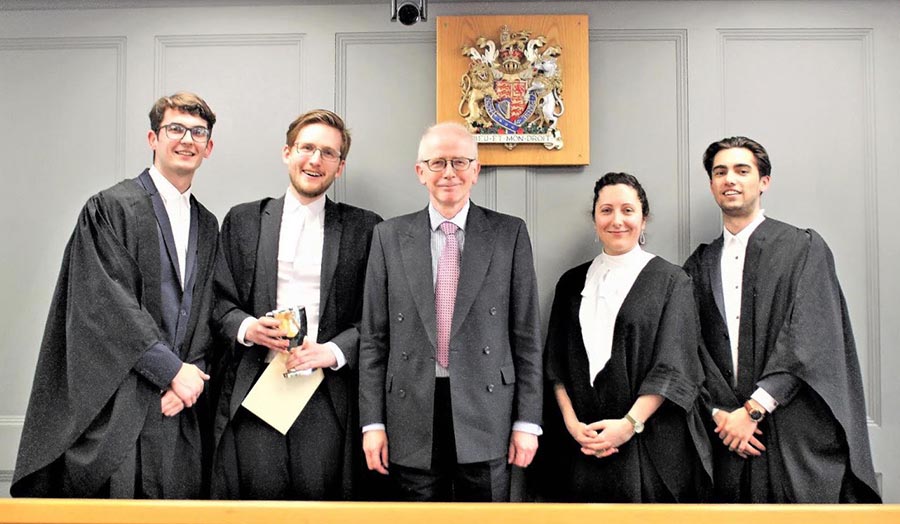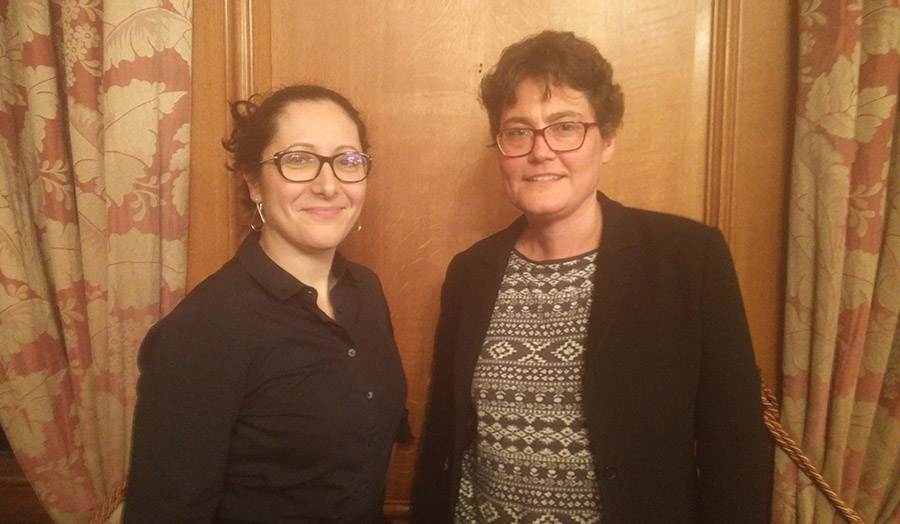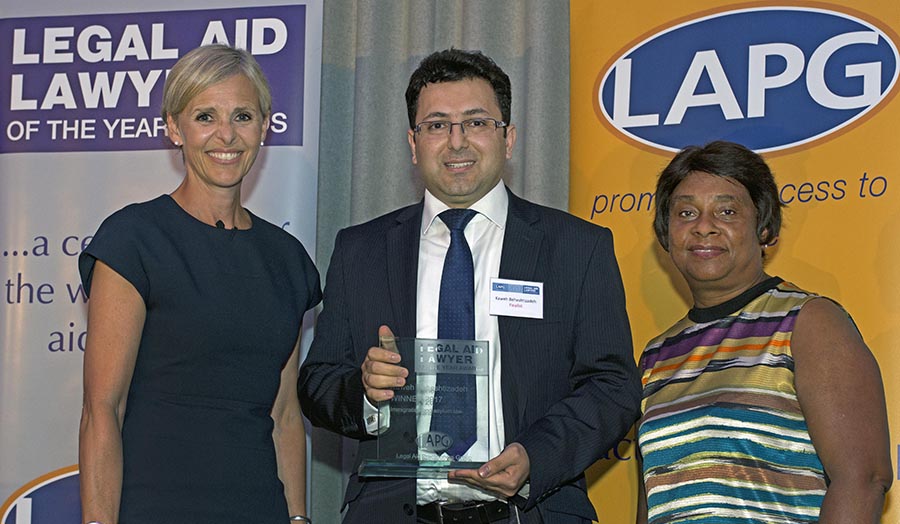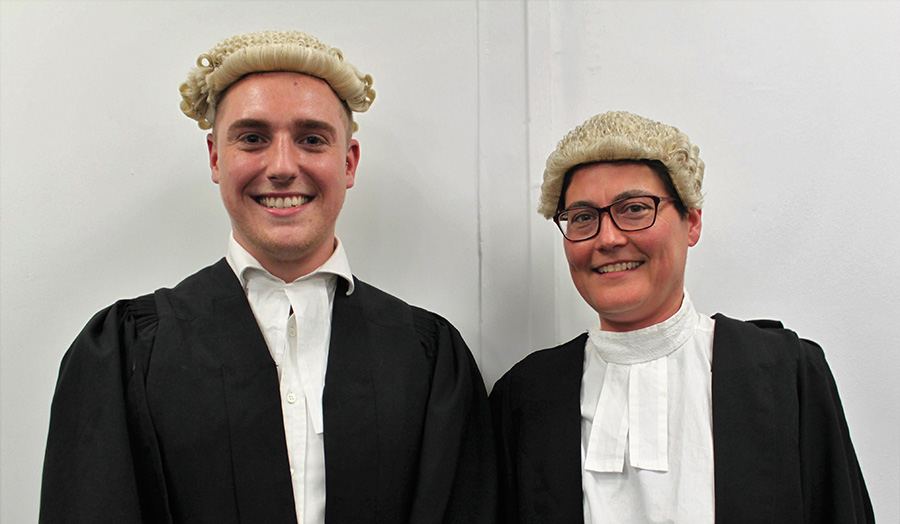Apply for this course
Please select when you would like to start:
If you are applying for place on the one year full-time course, you must do so through the Central Applications Board (Law cabs).
If you are applying for a place on the two year part-time course, use the apply now button to begin your application.
If you require a Student visa and wish to study a postgraduate course on a part-time basis, please read our how to apply information for international students to ensure you have all the details you need about the application process.
Why study this course?
London Met's Legal Practice Course (LPC) postgraduate diploma is designed to prepare you for employment as a trainee solicitor by providing a solid foundation in the skills and knowledge required in this career. Approved by the Solicitors Regulation Authority (SRA), this course can be studied full-time or part-time in the day or the evening.
Our law courses are ranked ninth in the UK for teaching quality in the Guardian University Guide 2023.
Ninth in the UK for teaching quality
Our law courses are ranked ninth in the UK for teaching quality in the Guardian University Guide 2023
Study in a way that suits you
This course can be studied full-time or part-time in the day or the evening
Boost your career prospects
If you have completed the academic stage of legal training, the Legal Practice Course postgraduate diploma will provide you with the professional stage of training required to qualify as a solicitor
Course modules
The modules listed below are for the academic year 2024/25 and represent the course modules at this time. Modules and module details (including, but not limited to, location and time) are subject to change over time.
Year 1 modules
Advocacy Skills
This module currently runs:autumn semester
(core, 0 credits)
This module focuses on the development of the skills of a presenting advocate including the ability to formulate and present a submission and to conduct or respond to cross-examination.
The module aims to provide students with the opportunity to develop or improve their advocacy skills.
Read full detailsBusiness Law and Practice
This module currently runs:autumn semester - Monday morning
autumn semester - Monday evening
autumn semester - Monday afternoon
autumn semester - Tuesday afternoon
autumn semester - Wednesday evening
autumn semester - Thursday afternoon
autumn semester - Thursday afternoon
(core, 24 credits)
This module focuses on the law and practice of starting, running and winding-up businesses, including sole traders, partnerships and private limited companies. A proportion of the module is devoted to the study of the construction and interpretation of business accounts.
The module aims to equip students with the knowledge and confidence required to work on transactions on the first day of their training contract as a solicitor.
Read full detailsDrafting Skills
This module currently runs:autumn semester
(core, 2.25 credits)
This module focuses on the skill of drafting legal documents. It aims to provide students with the opportunity to develop or improve their legal drafting skills.
Read full detailsInterviewing Skills
This module currently runs:autumn semester
(core, 5.5 credits)
The module aims to provide students with the opportunity to develop or improve their interviewing and advising skills.
Read full detailsLegal Writing Skills
This module currently runs:autumn semester
(core, 2.25 credits)
The module aims to provide students with the opportunity to develop or improve their legal writing skills.
Read full detailsLitigation
This module currently runs:autumn semester - Tuesday morning
autumn semester - Tuesday evening
autumn semester - Tuesday afternoon
autumn semester - Thursday morning
autumn semester - Thursday evening
autumn semester - Thursday afternoon
autumn semester - Friday morning
autumn semester - Friday afternoon
(core, 39.5 credits)
This module focuses on the law and practice of criminal and civil litigation procedure, evidence and advocacy. The module aims to equip students with the knowledge and confidence required to work on transactions on their first day of their training contract as a solicitor.
Read full detailsProfessional Conduct and Regulation
This module currently runs:autumn semester
(core, 1.5 credits)
The module addresses main aspects of professional conduct and regulation, including in relation to client care as well as aspects of money laundering and financial services relevant to legal practice.
The module aims to provide students with the opportunity to develop or improve their knowledge of the rules of professional conduct governing solicitors and the regulation of money laundering and financial service provisions.
Read full detailsProperty Law and Practice
This module currently runs:autumn semester - Monday morning
autumn semester - Monday evening
autumn semester - Monday afternoon
autumn semester - Monday afternoon
autumn semester - Tuesday morning
autumn semester - Wednesday evening
autumn semester - Thursday morning
(core, 24 credits)
This module focuses on the law and practice of buying and selling residential and commercial freehold property and leasehold property. A proportion of the module is devoted to the study of the construction and interpretation of solicitors' accounts, which is taught and assessed as a separate module, but based on the mechanics of freehold residential property transactions.
The module aims to equip students with the knowledge and confidence required to work on property transactions on the first day of their training contract as a solicitor. On completion of this module students should have a clear understanding of the various stages in a conveyancing transaction and of the legal and practical issues which are relevant to each stage. Students should have sufficient knowledge of the law and sufficient experience through practical exercises to deal confidently and effectively with a straightforward transaction from the taking of instructions through to registration and to be able to find solutions to any difficulties which may arise.
Read full detailsResearch Skills
This module currently runs:autumn semester
(core, 2.75 credits)
This module teaches the skill of practical legal research.
The module aims to provide students with the opportunity to develop or improve their practical legal research skills to the standard required of a trainee solicitor.
Read full detailsSolicitors Accounts
This module currently runs:autumn semester
(core, 6 credits)
This module focuses on the Solicitors’ Accounts Rules and the accounting principles used by solicitors in practice. The module aims to provide students with the opportunity to develop or improve their understanding of accounting principles and the rules that apply to solicitors.
Read full detailsWills and Administration of Estates
This module currently runs:autumn semester - Tuesday evening
autumn semester - Tuesday afternoon
autumn semester - Tuesday afternoon
autumn semester - Thursday evening
autumn semester - Thursday afternoon
autumn semester - Friday morning
autumn semester - Friday afternoon
(core, 2 credits)
This module focuses on the law and practice of probate and intestacy. It is assessed through the skill of interviewing.
The module aims to equip students with the knowledge and confidence required to work on transactions on the first day of their training contract as a solicitor.
Read full detailsAdvanced Business Law and Practice
(option, 13.5 credits)This module focuses on advising commercial clients in a partnership, company procedural and European competition context.
Child Law and Practice
This module currently runs:spring semester - Friday afternoon
spring semester - Thursday afternoon
(option, 13.5 credits)
This module offers a balance between the teaching of substantive law, practice and practical skills and focuses on common types of cases dealt with by child law lawyers.
The aims of the Child Law and Practice elective are to prepare students for work-based learning in a child law department; and provide a foundation for practice generally and child law work in particular.
Read full detailsCivil and Commercial Mediation and Alternative Dispute Resolution
(option, 13.5 credits)This module focuses on identifying the overall nature of the various methods of ADR, progressing that ADR method through a series of steps and decisions including, where appropriate, drafting documentation.
Commercial Law and Practice
This module currently runs:spring semester - Monday afternoon
spring semester - Tuesday morning
spring semester - Thursday evening
(option, 13.5 credits)
This module focuses on advising the commercial client in relation to commercial contracts.
This module aims to equip students to act as a trainee solicitor for commercial clients in order to negotiate and advise upon commercial contracts.
Read full detailsCorporate Law and Practice
(option, 13.5 credits)This module focuses on advising the corporate client on fund raising, acquisitions and joint ventures and becoming and operating as a public company.
Employment Law and Practice
This module currently runs:spring semester - Friday morning
spring semester - Thursday morning
spring semester - Monday evening
spring semester - Monday evening
(option, 13.5 credits)
The Employment Law and Practice Module covers most aspects of contentious employment law including unfair dismissal, redundancy and equality law. It also includes the procedural steps to bring or defend proceedings in the Employment Tribunal.
The module aims to teach students how to act for clients who want to bring or defend proceedings in the Employment Tribunal.
Read full detailsFamily Law and Practice
This module currently runs:spring semester - Friday morning
spring semester - Wednesday evening
spring semester - Tuesday evening
spring semester - Thursday morning
(option, 13.5 credits)
This module offers a balance between the teaching of substantive law, practice and practical skills and focuses on common types of cases dealt with by family lawyers.
The aims of the Family Law and Practice elective are to prepare students for work-based learning in a Family Law department; and to provide a foundation for practice generally and Family Law work in particular.
Read full detailsHousing Law and Practice
This module currently runs:spring semester - Thursday evening
spring semester - Thursday afternoon
(option, 13.5 credits)
This module aims to equip students to act as a trainee solicitor for landlords and tenants in the process of litigious housing law matters.
Read full detailsImmigration Law and Practice
This module currently runs:spring semester - Friday afternoon
spring semester - Wednesday evening
spring semester - Tuesday afternoon
spring semester - Tuesday evening
(option, 13.5 credits)
This module aims to equip students to act as a trainee solicitor for clients seeking immigration advice including on asylum law and practice and applicants for British nationality.
It focuses on advising the immigration law client on their rights and responsibilities and acting for them in the immigration courts.
Read full detailsIntellectual Property Law and Practice
This module currently runs:spring semester - Tuesday evening
(option, 13.5 credits)
This module focuses on advising the commercial client on their intellectual property law rights and responsibilities. It enables students to effectively apply law to specific scenarios in relation to four main aspects of intellectual property, namely copyright, patents, trademarks and design rights
This module aims to equip students to act as a trainee solicitor for commercial clients in respect of their intellectual property law rights and responsibilities.
Read full detailsPrivate Client Law and Practice
(option, 13.5 credits)This module focuses on advising the private client in respect of wills, probate and the administration of estates.














crop.jpg)


